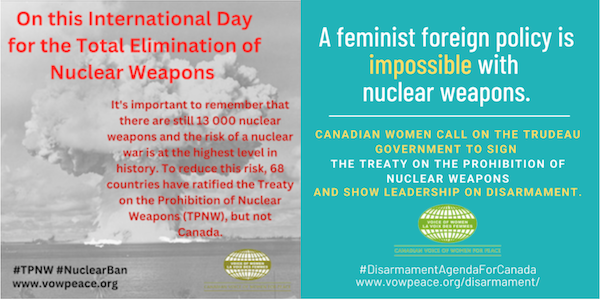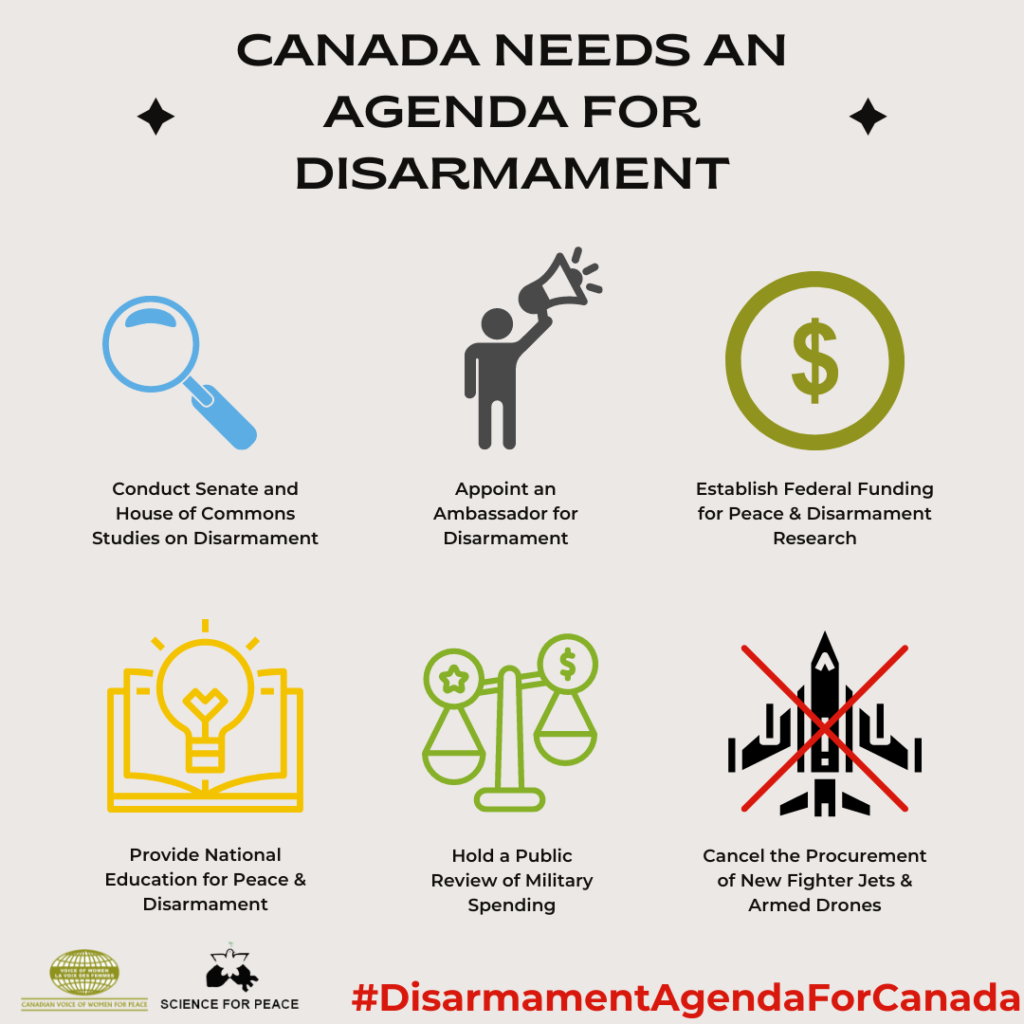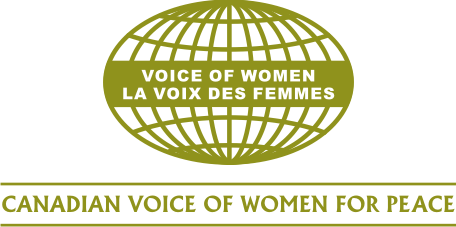VOW Urges PM Trudeau & Minister Joly to Sign the Treaty on the Prohibition of Nuclear Weapons
October 2, 2002 — Once again we are calling on the government to sign and ratify the Treaty on the Prohibition of Nuclear Weapons (TPNW). This latest appeal was penned by our new Peace Campaign Intern, Sarah Rohleder, on the occasion of the 8th International Day for the Total Elimination of Nuclear Weapons, September 26th, which is more important than ever given the current heightened danger of a nuclear war.

Below: Disarmament Campaign 2021
VOTE for Disarmament #ElectPeace

VOW has tirelessly worked towards disarmament since our inception. We believe Canada and the rest of the world must stop profiteering off people’s lives and start to dismantle the political economy of violence.

VOW hosted “Why Canada Needs An Agenda for Disarmament” Civil Society Meeting on June 21, 2021. Watch it below
“It is timely for VOW to be drawing attention to the fact that Canada lacks a disarmament agenda and has done so for many years. One has to go back to 1998 to find a substantive official document devoted to arms control and disarmament. This was the report of the standing committee of Foreign Affairs under the chairmanship of Bill Graham entitled “Canada and the Nuclear Challenge: Reducing the Political Value of Nuclear Weapons”. The Government provided a response to this report in April 1999 a white paper that outlined official policy on the subject and committed to several steps including annual consultations with civil society groups and appearances by the Ambassador for Disarmament before the Foreign Affairs Committee.
All this attention faded rapidly in the subsequent years. The commitments made for consultations and Committee hearings were respected for a few years and then allowed to peter out, without the Foreign Affairs Committee seeming very concerned. Supporting capacity for arms control and disarmament like the Verification Research Unit housed in the Department of Foreign Affairs were gradually starved of funds and then terminated.
If we fast forward to the advent of the government of Prime Minister Justin Trudeau, it decided instead of launching a foreign policy review to focus only on the defence and development sectors. The two outcomes of the review were issued in 2017. Not surprisingly, the defence review did not address disarmament, and somewhat more surprisingly nor did the development one. Although issued with the title “Feminist International Assistance” policy, it didn’t acknowledge that weapons from nuclear warheads to anti-personnel landmines posed not only a serious threat to development, but also to feminist values. When then Foreign Minister Chrystia Freeland made a rare foreign policy statement to the House of Commons on June 6, 2017 she didn’t have a single reference to arms control and disarmament.
The Trudeau government has promised to produce a “Feminist Foreign Policy” and late last year engaged in some consultations with NGOs on its contents. The government discussion paper accompanying these consultations didn’t mention disarmament and with respect to nuclear weapons only expressed concern over their proliferation – not their very existence with all the attendant risk of their use accidental or intentional. The Canadian Pugwash Group was one of those submitting a brief calling for a return of disarmament and a re-investment in diplomacy and the peaceful settlement of disputes.
In May 2018 the UN Secretary General released his “Agenda for Disarmament” with proposals for UN member states to consider. The Secretary General can propose, but it is the states that decide whether to act on those proposals. Regrettably, to date there has been little reference to or support for his recommendations. This despite the growth in geo-political tensions, the termination of arms control agreements and blatant sabre-rattling.
It is time for Canada to put the “disarmament” word back into its official vocabulary. A campaign by civil society to advocate for this is a step in the right direction. It once was said that “Canada had disarmament in its DNA” – it is time to restore this life force in the body politic. I wish you a productive consultation on this important theme.“
–Paul Meyer, Adjunct Professor of International Studies and Fellow in International Security, Simon Fraser University
Senior Advisor, ICT4Peace, Chair, Canadian Pugwash Group and former Canadian Ambassador for Disarmament
Canada Needs an Agenda for Disarmament
The Government of Canada and the Parliament of Canada have not done a comprehensive public study on disarmament. The last time that there was any parliamentary attention to disarmament was over twenty years ago. In 1998, the House of Commons Standing Committee on Foreign Affairs and International Trade Committee conducted a narrowly-focused report on nuclear deterrence and disarmament, which was entitled, Canada and the Nuclear Challenge: Reducing the Political Value of Nuclear Weapons for the Twenty-First Century. It is time that Canada make disarmament a national priority.
Disarmament is the act of reducing, limiting, or abolishing weapons. The removal of arms does not mean insecurity and defencelessness. Disarmament courageously creates the space for re-imagining the concept of security and re-envisioning the role of the state. It can also liberate international relations from the threat and use of armed force. Disarmament relies on the sophisticated, nonviolent practice of conflict prevention, diplomacy and mediation.
Three years ago, United Nations Secretary-General António Guterres urged members states to make disarmament a priority and launched Securing our Common Future: An Agenda for Disarmament. The 2018 Agenda for Disarmament has four main pillars:
Disarmament that saves humanity by endeavouring for a world free of nuclear weapons, strengthening norms against other weapons of mass destruction, and preventing the emergence of new domains of strategic competition and conflict.
Disarmament that saves lives by mitigating the humanitarian impact of conventional arms and addressing the excessive accumulation and illicit trade.
Disarmament for future generations by ensuring responsible innovation and use of advances in science and technology, keeping humans in control of weapons and artificial intelligence, and ensuring peace and stability in cyberspace.
Strengthening partnerships for disarmament by reinvigorating disarmament institutions and processes, engaging regional organizations, ensuring the full and equal participation of women, empowering youth as a force for change, and enhancing participation by civil society and engagement by the private sector.
The Agenda explains that disarmament can be achieved through measures such as elimination and destruction of weapons, prohibitions and restrictions, non-proliferation, regulation, transparency and confidence-building protocols, and remediation.
Disarmament is also essential to maintain international peace and security, protect civilians, and promote sustainable development. The Agenda acknowledges the important contribution of disarmament to achieving the UN Sustainable Development Goals (SDG) by 2030, in particular, SDG 3 (Good Health and Well-Being), SDG 8 (Decent Work and Economic Growth) and SDG 16 (Peace, Justice, and Strong Institutions). Secretary General Guterres called on all member states to create national plans for disarmament that include concrete actions and timelines.
Last year, Parliamentarians for Nuclear Non-Proliferation (PNND) published a handbook, Assuring Our Common Future: A Guide to Parliamentary Action in Support of Disarmament for Security and Sustainable Development, that complements the UN initiative. This handbook offers practical recommendations for parliamentary action and policy on disarmament.
The 2018 UN Agenda and 2020 PNND Handbook provide the necessary resources for the Government of Canada and the Parliament to take action.

Make Disarmament a Political Priority:
The Canadian Voice of Women for Peace (VOW) is calling for:
- The federal government to heed Secretary-General Guterres’ appeal and develop a national agenda for disarmament.
- The House of Commons’ Standing Committee on Foreign Affairs and InternationalDevelopment (FAAE) to conduct a comprehensive study that includes public consultations across the country, expert witnesses, a report and recommendations.
- The Senate Committee on Foreign Affairs and International Trade (AEFA) conduct a comprehensive study on disarmament that includes public consultations across the country, expert witnesses, a report and recommendations.
Our Disarmament Priorities for Canada:
1. Establish a dedicated Ambassador for Disarmament who regularly consults with civil society.
2. Develop a national action plan for disarmament that include specific actions and timelines.
3. Conduct a public analysis of military spending.
According to NATO’s Defence Expenditure latest report, Canada’s defence spending has dramatically risen over the past five years to $30.8 billion, which constitutes 1.31% of our GDP.
4. Sign the Treaty on the Prohibition of Nuclear Weapons (TPNW).
5. Establish a federal fund for public education, research and activity in disarmament, arms
control and non-proliferation.
6. Engage women and conduct a gender analysis of disarmament for Canada that supports
UN Security Resolution 1325 on Women, Peace and Security.
7. Educate and empower youth for disarmament to support UN Security Resolution 2250
on Youth, Peace and Security.
Disarmament explainer videos by the Office of the United Nations Office for Disarmament Affairs
Video 1: What is Disarmament
Video 2: Disarmament in the 21st century
Video 3: How does disarmament and arms control work?
Video 4:Disarmament and the Sustainable Development Goals
Video 5: How to engage
This disarmament campaign is supported by Science for Peace.
